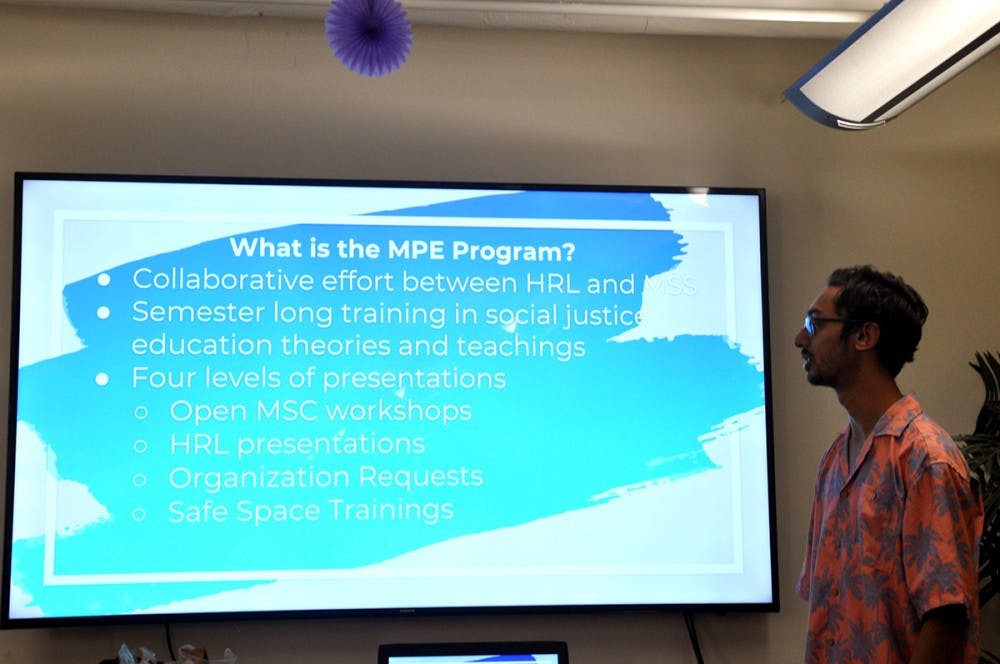The Multicultural Student Center hosted Multicultural Peer Educators for an open workshop titled “The Cycle of Socialization” Thursday. Fourth-year College student Nathan Pal and first-year College student Priya Batheja led a discussion on the continuous cycle of conscious and subconscious socialization and how this cycle leads to oppression.
Around a dozen students attended the workshop, which was open to the public. In an interview with The Cavalier Daily, Pal said that the demographics of the turnout represented a beneficial range of perspectives that included both those who may privilege from socialization — specifically white men — and those who are marginalized by it. However, Pal noted that those who represent privileged demographics are not typically as involved in MSC programming, but that their engagement would contribute to MPEs’ impact.
“That takes a little work from MPEs and also people who are coming — to reach out to friends in order to get diverse, different points of views from different backgrounds to come to these things,” Pal said. “I think today we had a really good showing of a lot of different diverse backgrounds and people.”
Pal and Batheja primed students for the workshop activity by introducing concepts such as social identities, socialization, oppression and the cycle of socialization. Social identity refers to how one perceives themself based on membership in social groups such as race or gender, and socialization refers to internalizing how social groups are perceived by society. The cycle of socialization includes being influenced on a personal level, then reinforced by institutional and cultural forces, and it can results in the oppression of marginalized groups if action is not taken to disrupt oppressive behaviors.
The group was tasked with the question of how this cycle of socialization can be broken within the University community.
Pal and Batheja agreed this process of redirecting the cycle begins with education. Pal noted that the MPE program and other services offered at the University on topics such as implicit bias, safe spaces and Green Dot training — which addresses sexual violence and is required of all first-years — are crucial calls to action for students to take up in their every day actions.
“That’s how you start spreading a safer space and a more inclusive space at U.Va.” Pal said. “And so honestly, getting more people educated is the primary goal and from that, watching things unfold and watching people start being active bystanders.”
In a group activity, students were presented with examples of identities that included the titles of black woman, Asian man, Muslim, Latinx, person with a disability, LGBTQ+ and American. Participants then wrote down any stereotypes associated with the given identities. When the group discussed their responses, they found minority groups were generally described with oppressive words, and descriptions attributed to the American identity were often based on stereotypical characteristics of white men — even though all of the other identities presented could also be classified as American.
Fourth-year College student Danya Abutaleb said she was drawn to the event to engage in discussion about inclusivity. Abutaleb said that the workshop on disrupting the socialization cycle allowed her to consider different approaches to combating oppression.
“It’s imperative to always remember to meet people where they are,” Abutaleb said. “Because while I might be on a journey where I’m in a different place [in reference] to respectability politic and validating my own anger, someone else might justifiably feel that they have an alternative method to deal with microaggressions and racism, and that’s entirely valid.”
Batheja said that the MPE program, established in 2017, hopes to draw in students from a wide variety of backgrounds so that the education can spread across Grounds. Batheja said that increasing the MPE pool — there are currently about 10 members — is an important step in getting more visibility for their work.
“Getting more educators to have their friends come in is going to be really helpful to make us more well known,” Batheja said. “Because I feel like our method is amazing and we want to project it more, but it’s hard to get people to come in, because if they don’t know about it, we can't blame them.”
Fourth-year College student Dani Bhadare-Valente participated in the workshop, and she also said it’s important that students who aren’t as familiar with the multicultural workshops to become aware and attend.
“The people that come to these typically want to be here and are very open to learning about these types of discussions and things like that, which is wonderful,” Bhadare-Valente said. “But I also want to see it expand itself and reach people that normally wouldn’t come to these types of events.”
Students are able to request a MPE workshop for their dorm association and other organizations on Grounds. The MPE program is also currently accepting applicants to become peer educators.







